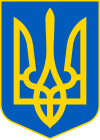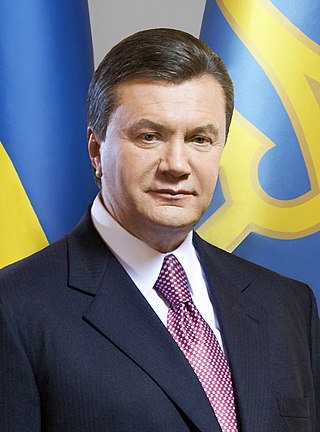
Viktor Fedorovych Yanukovych is a former Ukrainian politician, who was the fourth president of Ukraine from 2010 to 2014. He also served as the prime minister of Ukraine several times between 2002 and 2007 and was a member of the Verkhovna Rada from 2006 to 2010. A member of the pro-Russian Party of Regions, his removal from the presidency via revolution in 2014 led to the Russo-Ukrainian War. Since then, he has lived in exile in Russia.

The Verkhovna Rada of Ukraine is the unicameral parliament of Ukraine.
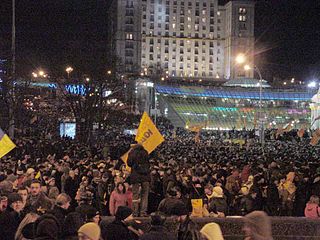
Below is the timeline of events that followed the runoff presidential election held in Ukraine on 21 November 2004 that sparked off the "Orange Revolution".

The Prime Minister of Ukraine is the head of government of Ukraine. The prime minister presides over the Cabinet of Ministers of Ukraine, which is the highest body of the executive branch of the Ukrainian government. The position replaced the Soviet post of chairman of the Council of Ministers of the Ukrainian SSR, which was established on March 25, 1946.

The Constitution of Ukraine is the fundamental law of Ukraine. The constitution was adopted and ratified at the 5th session of the Verkhovna Rada, the parliament of Ukraine, on 28 June 1996. The constitution was passed with 315 ayes out of 450 votes possible. All other laws and other normative legal acts of Ukraine must conform to the constitution. The right to amend the constitution through a special legislative procedure is vested exclusively in the parliament. The only body that may interpret the constitution and determine whether legislation conforms to it is the Constitutional Court of Ukraine. Since 1996, the public holiday Constitution Day is celebrated on 28 June.

The Constitutional Court of Ukraine is the sole body of constitutional jurisdiction in Ukraine. The Constitutional Court of Ukraine interprets the Constitution of Ukraine in terms of laws and other legal acts.
The All-Ukrainian Union "Fatherland", referred to as Batkivshchyna, is a political party in Ukraine led by People's Deputy of Ukraine, former Ukrainian Prime Minister Yulia Tymoshenko. As the core party of the former Yulia Tymoshenko Bloc, Batkivshchyna has been represented in the Verkhovna Rada since Yulia Tymoshenko set up the parliamentary faction of the same name in March 1999. After the November 2011 banning of the participation of blocs of political parties in parliamentary elections, Batkivshchyna became a major force in Ukrainian politics independently.
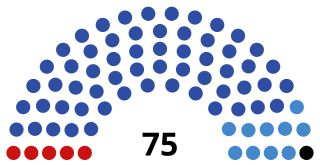
The State Council of Crimea is the parliament of the Russia-administered Republic of Crimea. It claims to be a continuation of the 'Supreme Council of Crimea' following a vote by the Ukrainian parliament to dissolve the Supreme Council of Crimea. The Parliament is housed in the Parliament building in the centre of Simferopol.
The political crisis in Ukraine lasted from April to June 2007 was part of political stand off between coalition and opposition factions of Verkhovna Rada that led to the unscheduled 2007 Ukrainian parliamentary election. It started on 2 April 2007 as a culmination of long lasting crisis and degradation of the parliamentary coalition when the President of Ukraine attempted to dissolve the parliament.

Oleksandr Valentynovych Turchynov is a Ukrainian politician, screenwriter, Baptist minister and economist. He is the former Secretary of the National Security and Defence Council of Ukraine.

Parliamentary elections were held in Ukraine on 28 October 2012. Because of various reasons, including the "impossibility of announcing election results" various by-elections have taken place since. Hence, several constituencies have been left unrepresented at various times.

The President of Ukraine is the head of state of Ukraine. The president represents the nation in international relations, administers the foreign political activity of the state, conducts negotiations and concludes international treaties. The president is directly elected by the citizens of Ukraine for a five-year term of office, limited to two terms consecutively.

The second Tymoshenko Government was appointed on 18 December 2007 as a coalition between Bloc of Yulia Tymoshenko (BYuT) and Our Ukraine-People's Self-Defense Bloc (OU-PSD), OU-PSD is the party of then-President of Ukraine Viktor Yushchenko, following the 2007 Ukrainian parliamentary election. The government program was named: "Ukrainian breakthrough: for people, not for politicians".

The Agreement between Ukraine and Russia on the Black Sea Fleet in Ukraine, widely referred to as the Kharkiv Pact or Kharkov Accords, was a treaty between Ukraine and Russia whereby the Russian lease on naval facilities in Crimea was extended beyond 2017 until 2042, with an additional five-year renewal option in exchange for a multiyear discounted contract to provide Ukraine with Russian natural gas.
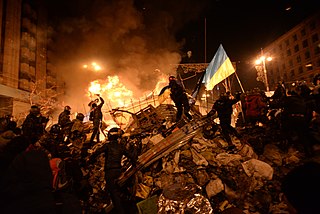
The Revolution of Dignity, also known as the Maidan Revolution or the Ukrainian Revolution, took place in Ukraine in February 2014 at the end of the Euromaidan protests, when deadly clashes between protesters and state forces in the capital Kyiv culminated in the ousting of elected President Viktor Yanukovych, the return to the 2004 Constitution of Ukraine, and the outbreak of the 2014 Russo-Ukrainian War.
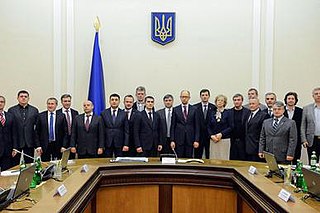
The first government headed by Arseniy Yatsenyuk was created in Ukraine on 27 February 2014 in the aftermath of the Revolution of Dignity. The cabinet was formed as a coalition of the Batkivschyna, UDAR and Svoboda political parties, the Economic Development and Sovereign European Ukraine parliamentary factions, and a number of unaffiliated MPs. On 24 July 2014, UDAR, Svoboda and 19 independent MPs exited the coalition to pave the way for the early parliamentary elections of late October 2014. Prime Minister Yatsenyuk announced his resignation the same day, but the Verkhovna Rada declined his resignation on 31 July 2014.

The Verkhovna Rada of Ukraine of the 8th convocation was a convocation of the legislative branch of the Verkhovna Rada, Ukraine's unicameral parliament. The 8th convocation met at the Verkhovna Rada building in Kyiv, having begun its term on 27 November 2014 following the last session of the 7th Verkhovna Rada. Its five-year term came to an end on July 24, 2019, marking the end of its tenth session.

The Agreement on the Settlement of the Political Crisis in Ukraine was a set of documents signed on 21 February 2014 by the then-President of Ukraine, Viktor Yanukovych, and the leaders of Ukraine's parliamentary opposition via the mediation of the European Union and Russia.
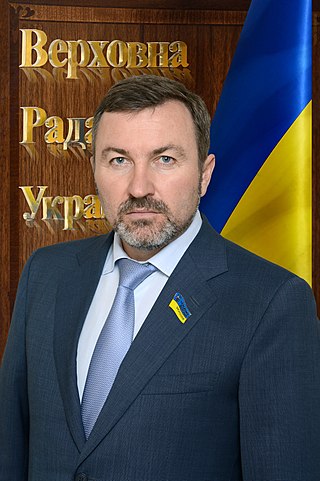
Andrii Fedorovych Shypko is a Ukrainian politician who served as a People's Deputy of Ukraine of the 7th and 8th Ukrainian Verkhovna Rada.
